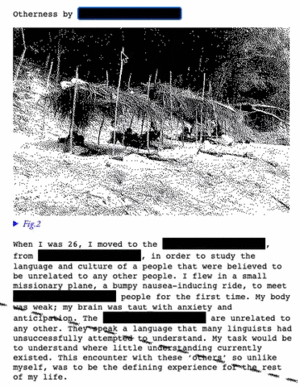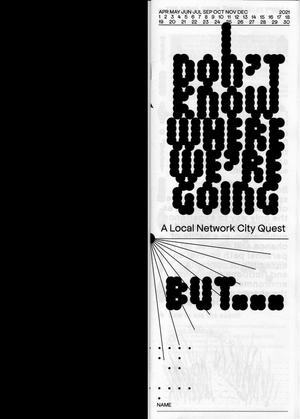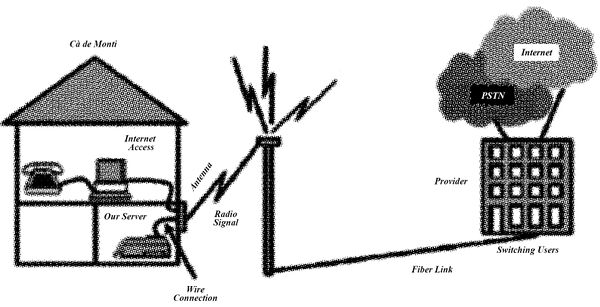User:Jacopo/final-presentation
- your individual contributions to the special issues,
- the development of your reading/writing practice across the 2 years,
- the development of your prototyping practice across the 2 years,
- your thesis (only a brief overview for context, as this has been assessed separately in depth),
- your final work and research in the second year,
- plans for final publication and grad show (with the understanding that you will continue to work on this after the assessment)
Roots
My previous academic career has been driving me inevitably to object-oriented design, aiming at solving specific issues. The tools we've been used to have been taken for granted till the beginning of XPUB. While starting questioning tools and processes, my perspective as a designer changed toward collective tools and practices, thanks to which become possible to address issues rather than contents, or objects. I've been bringing with me the sensibility I developed as a graphic designer, but I also understood that the tools suggest paths to follow (in terms of research, content gathering, layout) - which can be inherited by the specifics of the tool more than being designed just to be fancy.
Fancyness is cool, usefulness is cooler.
Year 1
Wor(l)ds for the Future
SPECIAL ISSUE 13
- Wor(l)ds for the Future collective page.
- Otherness, my individual contribution.
Facing Licensing for the first time. First time approaching re-publishing issues. How to preserve – expand – publish external resources/contributions? > Otherness by Daniel L. Everett.
Individual Contribution
Using black <input> form to delete nouns and places from the narration, and at the same time making the room for subjectivising the given essay.
1 person -> 1 interpretation of the reality ∞ people -> ∞ interpretations of the reality The reality is the cohexistence of all perspectives Otherness= individual1+individual2+.. = Oneness Embracing the Otherness
Embracing the Otherness means understanding our part in the given system of the world.
I created 3 web pages using Python. Pandoc has been used to translate markdown files into .HTML pages, but also to layout the printed version of the same pages.
- Demystifying HTML, .css
- Getting used to Python
- Web2print, Markdown, Pandoc
Woa!I didn't know I can make a printed publication out of a webpage!
Collective
Contextual Team + Design Team
I Don't Know Where We're Going, But..
SPECIAL ISSUE 14
I Don’t Know Where We’re Going But…"is a local networked city quest based in The Hague.
Playing with cities' elements and infrastructures.
The City as a Playground
The publishing process become a means for distributing (not-only) knowledge and the constitution of a public space of deliberation, where different points of social intersection could come across. Pleasure, intrigue and playfulness together in a "beautiful distribution" which embraces site-specificness as a method to re-approach the possibilities for sharing and assimilating contents.
Individual Contribution
- Python, Open CV.
- Warming up with Raspberry Pi
- Getting used to the Terminal
- Create a Local Area Network
- Making a server out of the Raspberry Pi
Contingent networks as a space for publishing.
Collective
- Worked with Martin on the identity of the Special Issue
- I designed, printed and hand-crafted with Nami and Euna the Booklet/Guide for the Launch Event @PNF, Den Haag
Radio Implicancies
SPECIAL ISSUE 15
Audio sources as a medium. The radio as a publishing platform.
- Radio Implicancies Archive
Individual
- Building-up a web radio: Liquidsoap + Html
- Playing with PureData, SonicPi
- Voices + Recordings
Collective
I designed and coded the Radio Implicancies Archive with Camilo.
Year 2
With Habitat, I started addressing issues. I didn't make books, but open platforms to serve the residency and its inhabitants > ways of co-operating and translate the local boundaries > addressing earthly coexistence based on cult-rural, community life.
"Living itself exists in forms that must be questioned, rearranged, mobilized, and undone."
N. Thompson, Living as a Form, 2012
Habitat
The local context: source of inspiration and action.
Publishing in this context means knowing how to orient oneself in its map, gathering resources, interfacing with the community, and developing a sensibility for the site-specificness of a project - be it an artefact, a tool, a temporary exhibition or a workshop - which can and must relate to the social, cultural and architectural fabric of the place.
Thesis
The Diary as a Form. The way to restore the most sincere, yet subjective image of Habitat as a cultural operation, but also as an experiment of living and surviving, was through the narration of daily encounters, discoveries, and all the details that compose the Habitat ecosystem.
(People in residence, Local communities and villages, resources, spaces, the environment, infrastructures..)
Started as a personal diary, later developed as a digital tool to be provided to Habitats' residents as a possibility to narrate/archive/publish memories.
Final work and research
Habitat Server
Autonomous Archiving Practices. Embrace the local conditions of connectivity. Habitat Archive and webpages are hosted in a webserver donated by XPUB, eventually installed in Cà de Monti. Part of it's browsable in different online spaces:
Habitat Giardino
A collaborative, decentralised Archive made with MediaWiki
Our "Giardino" is intended to be a shared space for collective care. Here, thoughts, knowledge, tools, processes and paths merge while flourishing together.
Habitat Radio
Habitat Radio works as a gatherer of bodies and minds, becoming nomad if needed. Recording and sharing become collective practices to narrate, expand, and archive thoughts, memories, conversations and processes.
Room for Memories
[beta] Submitting (and not forgetting about) memories has never been that easy. This tool collects each <input> inside one .md file (per memory), which is returned in a stream of collective memories.
Activating the Archive trough the space
Me and Federico Poni (Minister of Infrastructure) will set up the Slash Gallery as an extension of the Habitat's archive, in which the digital files archived in our server (in Cà de Monti) are physically transposed or activated inside the exhibitions space (Slash Gallery)
Highlighting the connection established between Rotterdam and Tredozio, which makes possible access to our server from the exhibition space. (Worm↔connection↔Cà de Monti)
Elements:
- Habitat Radio Station (Broadcasting for 1–2hours, inclusive programme: everyone can jump in)
- PRINT! button – Emulate the "Random Page" in the Wiki. It prints a random page from Habitat Giardino.
> The radio programme for the day will depart from the randomly printed pages.
- The paper Igloo made with the printed papers from the Archive
- Screening: Habitat 2021 Documentary projected on printed elements from the Archive (like hanging clothes)
- Habitat Bookshelf – a selection of zines, publications and printed matter created over the last year by different temporary residents.
- Background Music in the space, playing recordings from Habitat's Veranda Studio
- Poster: Open Call 2022 – with the poster I'm publicly projecting the intentions of Habitat toward the next session of residencies, scheduled for September 2022
- Various Artefacts: The Sacred Harmor, the Javelin Antenna, the Pin-nic television (video from the I° Concerto), Low-tech/rural devices
What to come?
On a personal layer: it's my life project. I want to grow here with Habitat, its flourishing community, the tools we create, the choral narration we reverberate through the valleys, and the spaces we dwell in with new meanings.
Recreating the ideal environment both for living and artistic practices, based on share and exchange. On Habitat's layer:
Begun as a temporary attempt to trigger the cultural landscape of Romagna toscana, Habitat became soon a shared action toward new, collective living forms. As soon as Habitat was established permanently in the village of Cà de Monti, since January 2022, it became an open, convivial place for hospitality, production, and research that has to be structured and developed, but also questioned and able to be re-shaped.
> an open platform for developing participative, cultural practices in the rural landscapes. > tooling the community. > cultural economies: redistributing funds to support research and production.



